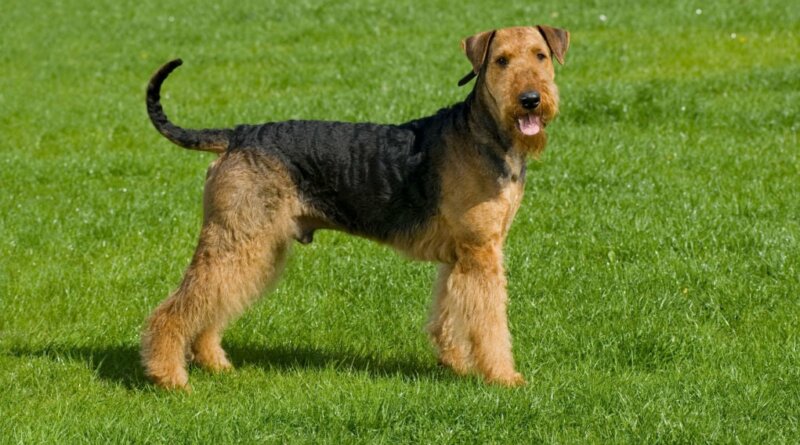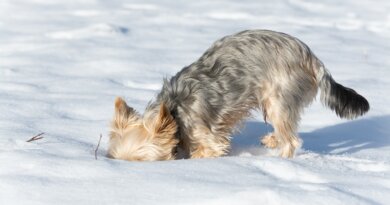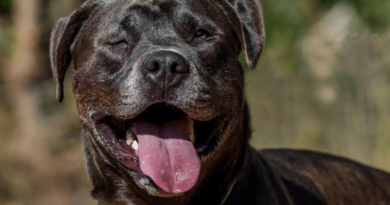Airedale Terrier Dog Breed Profile – Top Dog Tips
The Airedale Terrier breed grew from the Aire Valley of Yorkshire, initially built to catch rats and otters between Wharfe and Aire rivers.
Commonly called the King of Terriers, the Airedale is the largest terrier available.
With incredible strength, size, and spirit, this dog is one of the most versatile dogs available, distinguishing himself as an athlete, companion, and hunter.
This sporting dog became an ideal working dog companion, proving their worth exponentially during World War I.
The male Airedale Terrier stands 23 inches to the shoulder, with females sitting slightly less. They have a dense, wiry coat with trademark tan and black markings.
Their long and muscular legs give the Airedale a regal lift while walking. This breed portrays the very picture of an alert and willing terrier.
These dogs can be bold, determined, and occasionally stubborn. Although the Airedale Terrier is calm and patient with children, they won’t back down when trying to protect their home and family.
Airedale Terrier: Overview
The Airedale Terrier was bred as a multi-purpose dog, holding the keenness of a terrier, with the ability to smell prey and swim.
These dogs have the distinction of being working and sporting dogs, competing in obedience, hunt tests, and agility.
This breed thrives when completing a job, even if it’s nothing more than entertaining the children or family.
Although these dogs tolerate children well, they should always remain closely supervised due to their size.
Like all terriers, the Airedale can become destructive, with a penchant for chasing, barking, and digging.
These dogs are full of energy, making them excellent exercise companions. They enjoy daily walks, jogs, or adventures.
The Airedale Terrier Personality
The Airedale Terrier holds a strong independent streak, making him an intelligent dog that doesn’t always wait for direction from his owner.
He can sometimes be rather stubborn, making him less than ideal for the novice dog owner.
If you’re looking for a highly biddable dog awaiting your every command, the Airedale isn’t the breed for your family.
For owners wanting the perfect combination of loyal with a strong-willed personality, the Airedale Terrier is precisely what you’re looking for.
Training an Airedale Terrier requires calm and patient tones, as this breed will remain unforgiving with harsh treatment.
These dogs are known for holding a grudge against their aggressor, making them a stubborn breed overall.
The Airedale Terrier can be aggressive with other dogs and animals, thanks to their strong prey drive.
With an aggressive nature, these dogs can sometimes be challenging to handle. Owners must enlist in consistent and positive training regimes.
The Airedale Terrier makes an excellent watchdog over a family home or property. He will fearlessly protect his family from intruders, holding a fierce and brave loyalty.
Thankfully, this rough exterior only applies to unwanted guests, as the Airedale is friendly and warm with anyone invited into the home.
Thankfully, the Airedale isn’t all business; they have a comical and playful side that makes the entire family laugh.
He loves spending time with his family, playing and tossing toys around, and getting into trouble.
It’s not uncommon for an Airedale to create mischief, maturing slowly and remaining puppy-like well into old age.
Considerations for the Breed
Like all Terriers, the Airedale will hold a natural inclination to dig frequently. Unfortunately, these behaviors are also coupled with chasing small animals and barking.
As these terriers enjoy chewing, they will regularly chew anything available. As such, owners should leave the dog in a secure crate or kennel with sturdy toys.
Additionally, the Airedale also loves collecting cherished possessions from their human family. This behavior includes picking up anything, from children’s toys to underwear and dirty socks.
The Airedale Terrier needs daily exercise and activity as a high-energy working dog. These dogs will remain active and full of energy throughout their life.
This high energy level makes the breed unsuitable for apartment life; they’ll need a home with a large, fenced-in yard.
The Airedale Terrier is an independent dog but enjoys spending time with his family. This breed enjoys spending time with its owners and doesn’t adapt well to outdoor life.
While the Airedale Terrier is very good with children, they should always be supervised.
Physical Appearance of the Airedale Terrier
Known as the “King of Terriers,” this breed is the largest terrier available. These dogs stand at 23 inches on the shoulder, weighing approximately 45 to 70 pounds.
This breed will typically live between 10-13 years. The Airedale holds a classic terrier head with no forehead. The V-shaped ears top over and sit straight back.
The Airedale Terrier is black and tan and has a coat of dense, harsh hair. The grown-out coat will come across as almost curly, appearing almost gray and tan.
The Personality of the Airedale Terrier
With the blending of terrier and hound, the Airedale personality has softened the previously rugged character a bit.
These dogs are still quite challenging but will get along better with other canines than other dogs in the terrier category.
Airedales remain tolerant of other animals and pets but should be raised with them whenever possible.
The Airedale Terrier is often aloof with strangers at first, requiring early socialization and training. The Airedale is a brilliant dog but stands rather stubborn and independent.
Owners should maintain a gentle hand with these dogs to prevent ongoing conflict.
Although Airedales aren’t big on barking or vocalizations, chewing and digging can become problematic.
Every Airedale will require human interaction to remain content and happy.
Living with Airedale Terriers
An Airedale is rather varied regarding eating habits, ranging from largely finicky to prone to obesity. The breed is naturally active and needs daily exercise to stay happy.
Using training with exercise can improve mental and physical stimulation. An Airedale will alert owners of any danger, standing tall when facing a threat.
These dogs are pretty protective of their family, particularly small children. Early socialization is imperative as these dogs are stoic.
Grooming requirements can vary for each Airedale Terrier. Clipped coats allow for easy brushing and grooming.
Many pet owners opt for cutting the curly coat once or twice a year. For owners wanting a show coat, hand stripping is mandatory every few months.
The History of Airedale Terriers
Holding the distinction of largest terrier, these dogs are majestic and strong. The first attempt at creating the Airedale Terrier was in 1853.
A Rough-Coated Black and Tan Terrier was bred with an Otterhound, hoping to develop a sporting dog that could hunt otters.
The crossbreeding created a dog that showed the keenness of a terrier, with the ability to swim and scent game. The dog was a popular sporting terrier within 12 years of the first crossbreeding.
In 1864, the Waterside Terrier competed in their first dog show in Aire Valley. The judge declared the terrier exceedingly good, bringing immediate interest in the breed.
During this time, a group of fanciers joined and switched the name to Airedale Terrier.
Unfortunately, the name wasn’t initially used or accepted, generating much confusion.
For many years, owners used one or all three names for the breed until 1886, when the Kennel Club in England accepted the Airedale Terrier name.
Airedale Terriers were commonly used throughout World War I, acting as carriers of ammunition and food, sentries, messengers, ambulance dogs, ratters, sled dogs, and guard dogs.
As the war brought stories of the Airedale’s bravery and loyalty, popularity continued to climb. Calvin Coolidge, Warren Harding, and Theodore Roosevelt were among the thousands who owned and fancied the breed.
While the breed was ranked 20th in popularity in 1949, the rank has steadily declined due to German Shepherds being used in Airedale roles.
The Health of an Airedale Terrier
The Airedale Terrier is generally healthy but can become prone to specific health conditions.
Although not all Airedales will get any or all these conditions, it’s essential to remain aware of them.
When purchasing an Airedale puppy, research and find a decent breeder who offers health assurances.
A health clearance can prove a dog has been tested and cleared for specific medical conditions.
With Airedales, owners should receive health clearances from the Orthopedic Foundation for Animals (OFA) for the following conditions: hip dysplasia, hypothyroidism, von Willebrand’s disease, and eye issues.
Common Health Conditions for Airedale Terriers
Hip Dysplasia
Puppies will inherit hip dysplasia from their parents, which prevents the thighbone from sitting snugly in the hip joint.
Occasionally, dogs show pain or lameness on one or both rear legs. Other dogs won’t show any outward discomfort, relying on an x-ray diagnosis.
As the dog ages, dogs with hip dysplasia can develop arthritis. Dogs with this genetic condition should not breed.
Always ask the breeder for proof both parents were tested for hip dysplasia and are free of problems.
Allergies
Allergies remain a common ailment in dogs, with three main allergies.
They include food allergies, treated by removing the food from the Airedale’s diet, and contact allergies, which cause a reaction to something topical or airborne allergens.
Airborne allergens include mildew, dust, and pollen. Treatment for allergies will largely depend on the cause but have dietary restrictions, environmental changes, and medications.
Hypothyroidism
This chronic condition is a disorder of the thyroid gland.
Professionals believe this condition is responsible for epilepsy, obesity, alopecia, and other skin conditions. Veterinarians will treat these conditions through diet and medication.
Progressive Retinal Atrophy (PRA)
This family of eye diseases will often involve the gradual deterioration of the retina.
Early in this disease, affected dogs will become night-blind, losing sight during the day as the condition worsens.
Many dogs impacted by this disease will adapt well to limited or lost vision as long as all conditions in the home and surroundings remain constant and the same.
Umbilical Hernia
An umbilical hernia is present at birth due to an affliction of abdominal fat or internal organs protruding against the abdominal wall.
Small hernias may spontaneously resolve by the time a puppy is six months old. Large hernias often require surgery when the dog is neutered or spayed.
Surgery will prevent a much more severe condition, where an intestine loop drops into the hernia, causing life-threatening intestine strangulation.
Von Willebrand’s Disease
This condition is found in humans and dogs, impacting the clotting process.
The dog will have ongoing symptoms such as bleeding gums, nosebleeds, and prolonged bleeding from surgery.
They may also hold prolonged bleeding during heat cycles or birth. This disorder is commonly diagnosed between three and five years of age and cannot be cured.
Veterinarians can manage Von Willebrand’s disease with treatments including cauterizing or suturing injuries, avoiding specific medications, and transfusions before surgery.
Hemorrhagic Gastroenteritis
This condition causes diarrhea and vomiting with digested or fresh blood. The disorder comes on very quickly, with unknown causes.
Diagnosis is typically a process of elimination, as many diseases share similar symptoms. This condition requires prompt medical attention, with intravenous fluids to remain hydrated.
Should the dog become dehydrated, red blood counts will continue to rise until the blood is thick and slow moving.
Unfortunately, this symptom can cause another disorder, including disseminated intravascular coagulation, resulting in death. Treatment includes medications and antibiotics.
Airedale Terrier: Conclusion
The Airedale Terrier is a high-energy working dog that holds plenty of stamina. This breed requires extensive exercise. The Airedale loves to play, swim, retrieve, and goof around.
He is an excellent jogging companion, often tiring out his owner long before he’s out of energy. Training and early socialization are essential for this breed, beginning as a puppy.
Always take your Airedale to many places, exposing him to new scents, sounds, people, and animals early on.
Crate training is strongly recommended for the Airedale terrier, preventing an accident or issue when you’re not home.
This dog is stubborn, determined, and hard-working, which may be inappropriate for novice dog owners.
For those up for the challenge, Airedale Terriers are beautiful dogs with prominent personalities.
READ NEXT: Border Terrier Dog Profile









